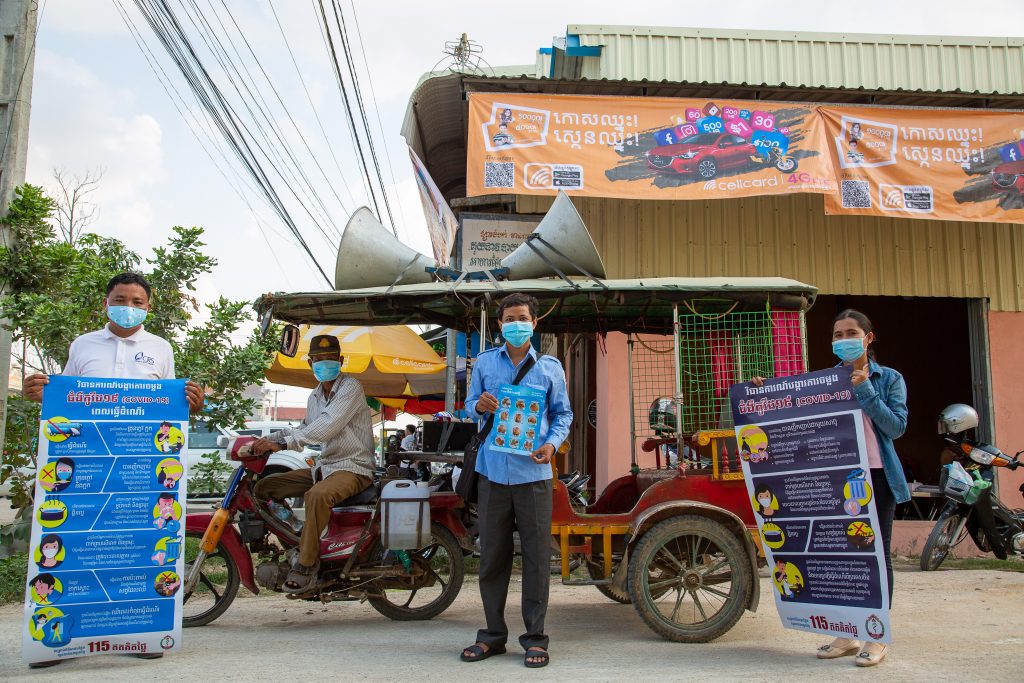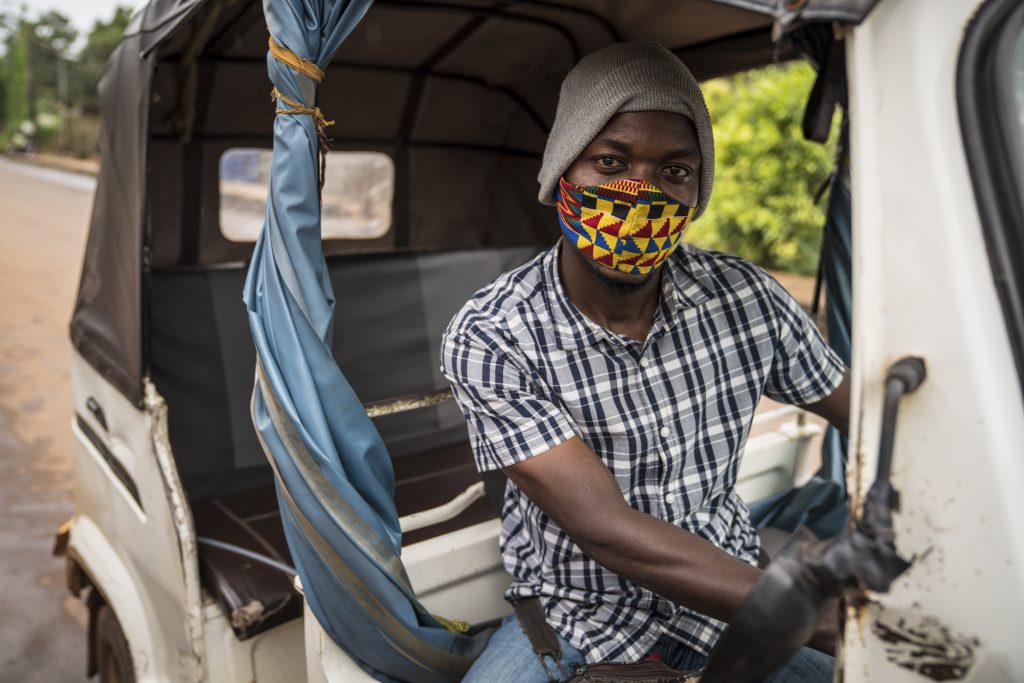Amid the fast-moving, worldwide outbreak of COVID-19, Catholic Relief Services (CRS) has ramped up its global public health programming to prevent and mitigate the spread of the deadly virus while at the same time taking proactive measures to protect the safety of its staff, which are spread across more than 110 countries.
“We are doing everything possible to leverage our vast global footprint to prevent and mitigate the spread of the virus and its impact,” said Sean Callahan, CRS’ president and CEO. “In addition, we are making changes to our business operations so that we can continue to function efficiently while also making sure we are able to serve those most in need.”


As the number of COVID-19 cases rise, Catholic Relief Services is responding in the world’s most vulnerable communities—distributing soap and hygiene kits, and sharing prevention messages that help minimize risk.
Our support can help stop misinformation and ensure access to safe water, hygiene and sanitation to prevent the spread of the virus.
When we give, we provide hygiene kits, personal protection equipment, lifesaving communication, and access to food and clean water. Our gifts help strengthen prevention messages about the virus and promotes proper hand-washing and sanitation in many of the most vulnerable areas around the world. The coronavirus is spreading but, with our vital support, we can help the people who are most susceptible prepare!
Here is a snapshot of what CRS has been up to all over the world:
MIDDLE EAST
- Afghanistan: CRS has been supporting and promoting healthy practices, such as hand-washing, by distributing over 60,000 bars of soap and educational leaflets about the virus and how to prevent it from spreading. Information about the virus was provided in community meeting areas like mosques.
- Gaza: CRS has distributed over 12,000 COVID-19 informational leaflets, held 14 caregiver awareness sessions, and sent information about the virus via text messages. More than 340 vulnerable families have been able to access hygiene items through CRS’ voucher program and staff are working to increase the availability of those supplies, as well as food assistance.
- Iraq: In vulnerable communities like Baghdad and Kirkuk, CRS has distributed information on how to best prevent the coronavirus from spreading and is working with Caritas Iraq to support seven health clinics with their COVID-19 response.
- Lebanon: CRS is supporting Caritas Lebanon to help train staff in healthcare centers on the best prevention and control methods. Staff members are also developing COVID-19 awareness materials like posters and flyers that can be given to local communities. CRS partners have begun distributing hygiene kits and gathering protective equipment and cleaning supplies for medical staff, volunteers and patients.
- West Bank: CRS is working with Coordinating Catholic Aid Organizations in the Holy Land, a network of 13 faith-based organizations, to support vulnerable families and health facilities that are responding to COVID-19. Most recently, CRS supported the opening of a COVID-19 testing center for those crossing into the West Bank.
AFRICA
With a presence in over 35 African countries, CRS is well positioned to carry out a response to a possible coronavirus outbreak. During the 2014 West Africa Ebola crisis, CRS and partners led intensive efforts to prevent the spread of the disease. Drawing on lessons learned during that experience, CRS is ready and well prepared to respond to a potential outbreak in Africa.
- Burkina Faso: For thousands of children in Burkina Faso, school closures have led to an increase in hunger and malnutrition. In order to combat this, CRS is distributing take-home rations to parents of students in more than 850 schools across the country.
- Burundi: In order to reduce the stigma around COVID-19, CRS staff have begun delivering radio messaging across the country, as well as delivering water tanks, soap and cleaning supplies to Catholic health centers.
- Central African Republic: Most recently, CRS has been able to provide clean water and hygiene supplies to Niem, a community that was previously blocked by armed groups. CRS has also supported 51 Catholic health centers by providing hygiene kits and training for health workers and distributed hand-washing kits to community staples, like schools and markets.
- Democratic Republic of the Congo: CRS is working to support preventative measures, like reinforcing correct hand-washing techniques, as well as providing accurate information about the virus through radio broadcasts. More than 5,000 families have been registered to recieve household supply kits, and of these, 2,000 of the most vulnerable will recieve food.
- Ethiopia: Alongside local governments and the Ministry of Health, CRS is working to increase general awareness of COVID-19 and provide partner health facilities with protective gear. Some of these materials, along with tents and infrared thermometers, have already been provided to more than 100 Catholic health facilities across the country, which support more than 300,000 people.
- Ghana: CRS has provided more than 620 health staff with personal protective equipment, trained 566 health care providers on COVID-19 prevention, and installed more than 200 communities with hand-washing stations. Additionally, more than 4,200 community-based health care workers have been given training on COVID-19, allowing them to go house-to-house to provide safety and prevention awareness.
- Guinea: CRS has distributed soap and sanitizer at the central prison in Conakry as well as supported the ministry of health in providing personal protective equipment for more than 530,000 health workers and volunteers.
- Kenya: CRS staff have completed trainings for 3,500 Nairobi health care workers as well as provided hand-washing booths in high-volume health facilities. CRS is also working with local governments and the Kenya Conference of Catholic Bishops to broadcast COVID-19 messaging over the radio, as well as supporting three Catholic hospitals in Nairobi that serve high-risk populations living in informal settlements and low-income communities.
- Liberia: With the support of the National Catholic Health Council in Liberia, CRS has trained more than 660 health care workers in 23 health facilities on COVID-19 detection, as well as secured protective gear for them.
- Madagascar: More than 11,700 families have been provided with soap and water cans in order to practice proper hand-washing. So far, CRS staff have trained more than 50 people to raise awareness and distribute hygiene items across 1,089 villages.
- Malawi: CRS is supporting 980 families living in extreme poverty with cash assistance. During the distribution, CRS staff members provide those families with accurate COVID-19 information, including prevention tips.
- Mali: CRS is providing those in need with personal protective equipment and, through the McGovern-Dole Food for Education program, is working to get take home meals to students while schools are closed.
- Nigeria: In communities where CRS is still actively working, staff are distributing more than 500 hand-washing stations, soap, hygiene kits and prevention information. In refugee camps in northwest Nigeria, CRS is continuing construction on vital structures like showers, latrines and water points. CRS staff members have also trained more than 570 volunteers to serve as community mobilizers and provide COVID-19 prevention and safe practices.
- Sierra Leone: Through the McGovern-Dole Food for Education program, CRS staff prepared take home meals for more than 50,000 students and 1,500 teachers. A second phase of these take-home rations has begun for 282 schools. CRS is also supporting the reopening of sixth grade classes in more than 130 schools and distributing jerry cans to 310 schools in the Koinadugu and Kabala districts.
- Somalia: CRS and partners are conducting door-to-door screenings and focused on continuing to raise awareness about COVID-19 and dispel myths about the virus.
- Senegal and The Gambia: CRS trained local tailors to make 30,000 washable masks that were then given out at hand-washing stations at schools, markets, and transit stations. Health workers, village leaders, and 300 community-based surveillance groups were also trained on COVID-19 prevention.
ASIA
- Bangladesh: So far, CRS and Caritas staff have provided more than 8,000 people in Bangladesh with accurate COVID-19 information through household visits. Staff have also adapted all programming to be COVID-19 safe, including the work CRS does in Rohingya settlements.
- Cambodia: CRS is working closely with the health ministry to provide support where needed, assist with spreading accurate health information about the virus. More than 1,900 high-risk villages have received COVID-19 educational sessions and 670 quarantine center staff members have received training.
- India: Together with Caritas, CRS has provided hygiene kits and prevention information to over 500 migrant workers.
- Indonesia: Almost 4,500 families across the country have been given hygiene kits and CRS staff have distributed hand sanitizer and masks to 110 village health workers. CRS has also installed 40 portable hand-washing stations in eight villages, helping more than 1,200 families avoid COVID-19.
- Myanmar: CRS is supporting Caritas in Kachin State to provide hand-washing stations to displaced people, as well as converting two buildings in the state into isolation centers. Nine Catholic health clincs have also received help getting personal protective equipment and delivering key COVID-19 messaging.
- Nepal: Through community leaders, CRS has distributed 11,500 informational brochures and more than 200 banners with COVID-19 messaging to four districts. Local staff are also working on re-engineering mapping technology that will allow local officials to track confirmed cases.
- Philippines: Staff members are providing food baskets to 150 people with disabilities and cash assistance to other vulnerable families that will allow them to have food and hygiene items for at least the next month.
LATIN AMERICA AND THE CARIBBEAN
- Guatemala: CRS is continuing to provide support for communities in the Western Highlands, including COVID-19 prevention for more than 89,000 people and training health workers and community leaders on how to provide mental health support.
- Haiti: CRS is working to support schools as they prepare for reopening. While students were still in lockdown, CRS staff distributed 800 workbooks designed to help manage stress, as well as conducted screenings for children under 5, looking for signs of acute malnutrition.
- Honduras: In order to keep children across the country eating nutritious meals, CRS staff have provided take-home food rations for more than 50,000 students.
- Mexico: CRS is working with partners that manage several shelters along the migrant routes and U.S.-Mexico border to improve COVID-19 awareness and adjust safety procedures. 23 shelters in Central Mexico have also received donations from CRS of food and hygiene kits. As shelters have begun reopening, CRS and Caritas Mexico have been begun holding workshops for shelter staff on how to reduce the risk of COVID-19 outbreaks.
EUROPE
- Albania: CRS is supporting Caritas Albania as it adapts its emergency food distribution to include hygiene items and COVID-19 prevention tips for families affected by the November 2019 earthquake.
- Bulgaria: CRS has expanded its partnership with Caritas Sofia to help provide 400 hot meals and hygiene kits for marginalized groups, including homeless, elderly, refugees and migrants.
- Bosnia and Herzegovina: CRS is working closely with migrants and refugees to raise their awareness of COVID-19 and best prevention practices. Staff have also provided 2,700 elderly people with home deliveries of food and hygiene items.
- Italy: Together with faith-based partners, CRS is supporting “Contagion of Hope” in Lombardy, which provides food, shelter and hygiene supplies to people most vulnerable to COVID-19. More than 43,000 people have been provided with food, water, shelter and hygiene supplies.

